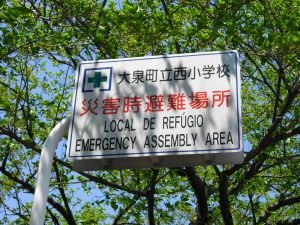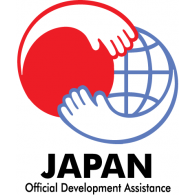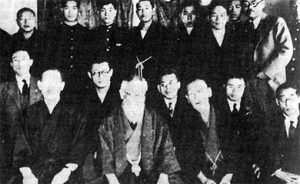Veranstaltungen und Aktivitäten
The Role of Mediating Institutions for Brazilian Return Migrants in Japan

In the 1980s, the economic downturn and hyperinflation in Brazil motivated many descendants of Japanese migrants (Nikkeijin) living in Brazil to ‘return’ to Japan, where an aging population and a booming economy had led to a labor shortage. Another incentive was the revision of the Japanese Immigration Law in 1990 that allowed Nikkeijin up to the third generation to obtain special permanent residency visa. Approximately 220.000 Latin American returnees arrived in the 1990s, and more than 180.000 Brazilians live in Japan today, constituting the fifth largest group of foreigners. As many have decided to stay in Japan for the time being, integration and multiculturalism have become important societal challenges, especially on the local level.
Based on qualitative field research, Chaline Timmerarens from Freie Universität Berlin analyzes how mediating institutions affect the process of integration into the host society and the relations to Japanese residents. She focuses on cultural centers, international associations, libraries, churches, and NPOs in cities with a high population of Brazilian Nikkeijin and Brazilians, namely Hamamatsu (Shizuoka), Toyota (Aichi), and Ōizumi (Gunma).
Speaker:
Chaline Timmerarens, Freie Universität Berlin
Picture: Multilingual (Japanese, Portuguese, English) Emergency Assembly Area Sign in Oizumi, Gunma
History-writing and the Public Sphere in Japan: 1945-1955
History-writing in Japan after World War II was more than just documenting the past; it was also about how to reconstruct the present and future. Japan was occupied by the United States and Allied powers and this occupation quickly turned to a new form of repression for many intellectuals, students, women, and others, even after it formally ended in 1952. In this climate, history-writing became part of social activism and the desire to change Japan in fundamental ways. Radical forms of history-writing became prominent and these sought to incorporate ordinary people in everyday life. They also sought engagement with the public sphere on a number of different levels and in ways that continued to have an impact on the writing of history after 1955.
This presentation will argue that history-writing during the first decade after World War II brought a kind of “plebian public sphere” into focus in ways that had not been seen in Japan during the prewar period.
Speaker:
Curtis Anderson, Waseda University
Destiny: The Secret Operations of the Yodogō Exiles

In 1970, nine members of a Japanese New Left group called the Red Army Faction hijacked a domestic airliner to North Korea with dreams of acquiring military training in order to bring about a revolution in Japan. The North Korean government accepted the hijackers ̶ who became known in the media as the Yodogō group ̶ and two years later they announced their conversion to juche, North Korea’s political ideology.
This talk will trace the story of the Yodogō exiles to North Korea, Kōji Takazawa’s involvement in their story and his work of investigative journalism.
Speakers:
Patricia G. Steinhoff, University of Hawai‘i at Mānoa
Scott North, Osaka University
Japanese Development Cooperation as a Political Tool

The world of development cooperation is changing quickly. There are several reasons for this. First of all, the objectives of the Sustainable Development Goals (SDGs) adopted by the United Nations go well beyond poverty reduction. Another reason is the fact that once dominant western thinking in the field of Official Development Assistance (ODA) is fading away as new donors, such as China, are advancing their positions.
In this lecture Marie Söderberg will give a picture of how Japanese foreign aid now plays a central role as a foreign policy instrument. Taking the Philippines as an example, she analyses the implementation of Japan’s 2015 Development Cooperation on the ground.
Naohiro Kitano will contribute his expertise on China’s foreign aid. China’s ODA is undergoing a transformation as China is rapidly stepping up its activities and expanding its influence especially in Southeast Asia.
Speakers:
Marie Söderberg, Stockholm School of Economics
Naohiro Kitano, Waseda University
Gemeinsame Bücherausstellung:
Kabuki・Bunraku

Wie wird die klassische japanische Bühnenkunst im Ausland gesehen und welche Forschung gibt es dazu?
Die International House of Japan Library, die Bibliothèque de la Maison franco-japonaise sowie die Bibliothek des Deutschen Instituts für Japanstudien geben im Rahmen einer gemeinsamen Bücherausstellung Einblicke in englisch-, französisch- und deutschsprachige Übersetzungen sowie Forschungsliteratur zum Thema Kabuki und Bunraku.
Picture Copyright: 国立博物館所蔵品統合検索システム
space AGE space – Elderly Care in a Digitally Connected World

How can sensor technology and connectivity support care-taking? How far are we away from implementation? Which countries are taking the lead? What major obstacles need to be overcome?
A central part of Society 5.0 – Japan’s vision of fully digitally connected future – focuses on how connectivity, big data and AI can contribute to solve Japan’s pressing problems in the field of elderly care. Prof. Thomas Bock, a leading German engineer in the field of building robotics, and Prof. Shuichi Matsumura, a leading Japanese engineer specializing in system design for housing and urban spaces, will talk about the potential of the digital revolution for elderly care in living environments.
Speakers:
Thomas Bock, Technical University of Munich
Shuichi Matsumura, The University of Tokyo
Tokyo as Fashion Space: Usage Practices, Social Space and Media Discourse

For the world of street fashion, the seemingly small neighborhood of Harajuku has become a nationally as well as internationally renowned hotspot where all kinds of trends are shaped and reinterpreted every day. Harajuku also is a prime example of how social attribution processes work within a city: If popular discourse had not defined and named the area, it would only exist as Shibuya-ku Jingūmae and Takeshita dōri or Cat Street would only be nameless roads.
The aim of this research is to explore how this small piece of land came to be recognized as a fashion space from the early 1970s onwards and how it has continued to attract creatives and shoppers alike, even in a fashion world that has seemingly shifted to location-indifferent online media.
Speaker:
Jana Katzenberg, University of Cologne
Picture Copyright: CC BY-NC-ND 2.0 | flickr/jun560
Informal Figures of Japanese Imperialism: the political activism of the Gen’yōsha

The history of Japanese nationalism and expansionism remains a controversial part of the nation-building process in postwar Japan. Many historians have struggled to come to terms with the ambivalent role of the past in the processes of modern nationalism and imperialism. In this respect, the history of the Meiji era is particularly controversial.
This talk will focus on the political association Gen’yōsha and its members during the 1868-1910 period. It will show how the association was an integral part of the Freedom and People’s Rights Movement and its spearhead in the Kyūshū region. After presenting the historical process that led to the foundation of the Gen’yōsha, it will explain how the group played an instrumental role in the uprising of the so-called tairiku rōnin, and how these political activists where important elements of Japan’s expansionist policies.
Picture: Public Domain | wikimedia





 Open Access
Open Access 
